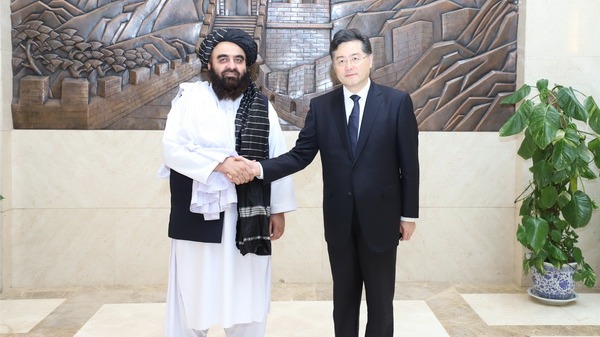

Afghanistan’s Acting Foreign Minister Amir Muttaqi with Chinese Foreign Minister Qin Gang
The Afghan Ministry of Industry and Commerce (MoIC) announced that China has signed investments worth around $2 billion after the Taliban formed a government in Afghanistan. This much-needed investment is a shot in the arm for both – the Taliban regime, still unrecognised by most of the world, as well as China.
The investments are in the extraction of mines, oil drilling, services at airports and in industrial parks. Also, Chinese investors have been regularly visiting Kabul to seek out different areas for investment.
Afghan MoIC spokesman Akhundazada Abdul Salam Jawad said: “The contracts have been signed for the extraction of mines, in areas of providing services at the airports, and the formation of industrial parks. Practical work has begun and total investment is reaching $2 billion. There will be contracts for the modernization of customs offices and other areas with foreign companies”.
China is ready to help Afghanistan realize self-reliance, peace, stability, development and prosperity at an early date, said Chinese State Councilor and Foreign Minister Qin Gang. #GLOBALinkpic.twitter.com/B4VOU5lDga
— Zhang Meifang (@CGMeifangZhang) May 8, 2023
India Narrative spoke with Research Fellow Dr Anwesha Ghosh at the Indian Council of World Affairs (ICWA) to understand Afghan-China relations. She says that China had always been interested in Afghan minerals. “They tried earlier when Afghanistan was a republic but things did not shape up somehow. With the Taliban coming to power in Kabul, China did not express its reservations regarding the Taliban. China has been engaging with Afghanistan for long even without Pakistan’s support”.
The investment – to the tune of $2 billion – by China almost seems to have materialised suddenly. The announcement by MoIC also happened at a time when Afghanistan’s Acting Rural Rehabilitation and Development Minister, Mohammad Younus Akhundzada had called upon foreign investors to invest in the country.
“It now looks as if the Amu Darya deal from January was an exploratory project for China to see whether the Taliban government can be trusted with bigger projects. China possibly also wanted to understand if it had the capacity to work with the Taliban. With the $2 billion investment, China feels that it is feasible to work with Afghanistan”, says Ghosh.
For Afghanistan, the investments from China are a big boost as the hitherto pariah government gets a measure of recognition from a global power. This is likely to increase confidence in the Taliban government with a few friendly nations which may also help bring in other investors like Iran and Turkey.
Even as the trio of China, Pakistan and Afghanistan explore investments and search for ways of reducing terrorism related risks, India has taken a completely different pathway to dealing with the Taliban government in Afghanistan. Even as India has not shown an inclination to invest, it has been sending food and medicine aid through Pakistan as well as the Chabahar port in Iran.
Ghosh says that India has continued with its humanitarian approach towards the Afghan people in dealing with the Taliban.
The Taliban desperately seeks investments in the country to run the government. This is where Beijing has stepped in to benefit the Taliban. The government in Kabul understands that with Beijing, there is no free lunch. The treasure trove of minerals can be exploited for the recognition of the regime which can be touted as a success for other countries to pitch in.
Also read: Will the ISIS attack in Kabul wreck Chinese dreams in Afghanistan?
Australia's High Commissioner to India, Philip Green OAM, called Yoga one of India's gifts to…
The Bharat Sanchar Nigam Limited (BSNL) has announced the soft launch of BSNL Quantum 5G…
The Indian Embassy in Iran has said that the embassy will make efforts to evacuate…
India's gross direct tax collections for the financial year 2025-26 rose by 4.86 per cent…
Russian President Vladimir Putin has said that Moscow is not seeking Ukraine's unconditional surrender, but…
Extending his greetings on the 11th International Day of Yoga, Lok Sabha speaker Om Birla…